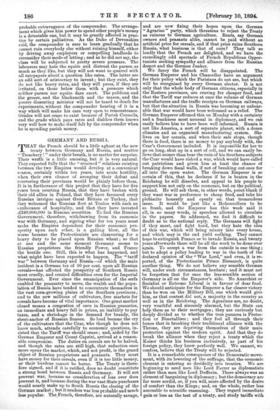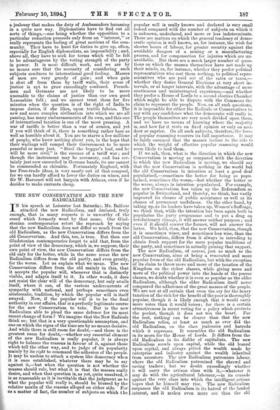GERMANY AND RUSSIA. T HAT the French should be a little
aghast at the new treaty between Germany and Russia, and mutter " Treachery ! " under their breath, is no matter for surprise. Their wrath is a little amusing, but it is very natural. They expected fully that the " strained " relations existing between the two Empires would develop at a convenient season, certainly within ten years, into acute hostility, when their own chance of avenging their defeat and recovering their provinces would. be plainly before them. It is in furtherance of this project that they have for five years been courting Russia, that they have broken with their old allies in Poland, that they have favoured every Russian intrigue against Great Britain or Turkey, that they welcomed. the Russian fleet at Toulon with such an exuberance of hospitality, and that they have invested X2,40,000,000 in Russian securities. To find the Russian Government, therefore, withdrawing from its economic war with Germany, and signing what for ten years must make the Empires dependent for their economic pro- sperity upon each other, is a galling blow, all the worse because the Protectionists are clamouring for a heavy duty to be placed upon Russian wheat ; so that at one and the same moment Germany seems to Russian proprietors the friendly Power, and France the hostile one. Still, this is what has happened, and what might have been expected to happen. The "tariff war" between Germany and Russia—of which the main incident is a German tax of 50 per cent. upon all Russian cereals—has affected the prosperity of Southern Russia most cruelly, and. created difficulties even for the Imperial Government. Ever since the emancipation of the serfs enabled. the peasantry to move, the wealth and the popu- lation of Russia have tended to concentrate themselves in -the vast corn-growing plains of the Southern provinces ; and to the new millions of cultivators, free markets for cereals have become of vital importance. One great market closed means a congestion of corn in Russian granaries, an immediate and. heavy fall in prices, an inability to pay taxes, and a shrinkage in the demand for brandy, the sheet-anchor of Russian finance. So loud. became the cry of the cultivators that the Czar, who though he does not know much, attends carefully to economic questions, in- sisted that the Tariff war should. cease ; and, aided by the German Emperor and. Count Caprivi, arrived at a reason- able compromise. The duties on cereals are to be halved, and though the rates are still high, that reduction once more opens the market, which, and not profit, is the grand object of Russian proprietors and peasants. They must have money for their cereals, even if it is too little money, or their burdens cannot be borne. The Treaty is there- fore signed, and if it is ratified, does no doubt constitute a strong bond. between Russia and Germany. It will not prevent war, because no consideration of loss ever does prevent it, and because during the war vast State purchases would. nearly make up to South Russia the closing of the German market ; but it renders war less probable and much less popular. The French, therefore, are naturally savage, and. are now fixing their hopes upon the German " Agrarian " party, which threatens to reject the Treaty as ruinous to German agriculture. Rents, say German owners and. peasants alike, cannot be paid without an artificial price for cereals, and if that price ruins Southern Russia, what business is that of ours ? They talk so loudly that the French are delighted, and we have the exceedingly odd. spectacle of French Republican Oppor- tunists seeking sympathy and alliance from the Russian despot and the German Junker.
We fancy the French will be disappointed. The German Emperor and. his Chancellor have an argument for their policy which the Parisians do not see, but which will be recognised by every German elector. It is not only that the whole body of German citizens, especially in the Eastern provinces, are craving for cheaper food, and that the Tariff war reduces at once the volume of German manufactures and the traffic receipts on German railways, but that the situation in Russia was becoming so unbear- able that war would have been welcomed. as a relief. The German Emperor affirmed. this on Monday with a certainty and a frankness most unusual in diplomacy, and we can easily believe hint to have been well informed. Russia is not like America, a sort of separate planet, with a dozen climates and an organised manufacturing system. She lives on her cereals, and when their sale stops, though there is food, there is no money to pay anybody with, the Czar's Government included. It is impossible for her to go on long, shut up in a sort of cell, and we can easily be- lieve that sooner than bear the ruin of his Southern subjects the Czar would have risked a war, which would. have called out patriotism and given him at least the chance of breaking down fiscal walls, if not of breaking out once for all into the open water. The German Emperor is so certain of this, that he declares if he is beaten in the Reichstag he will dissolve, and. appeal to his people to support him not only on the economic, but on the political, ground. He will ask them, in other words, point-blank if they want war in preference to cheap food, and. take his plebiscite honestly and. openly on that tremendous issue. It would be just like a. Hohenzollern to be so frank, and the Emperor has this week said it all, in so many words, in speeches allowed to circulate in the papers. So addressed, we find it difficult to doubt as to the national reply. The Germans will fight if they must, and. fight hard, but they hate the idea of this war, which will bring misery into every house, and which may in the end yield nothing. They cannot hope to extinguish France or to invade Russia, and twenty years afterwards there will be all the work to be done over again. To accept a war from the outside is one thing ; but to adopt a policy leading to war in the teeth of the declared opinion of the "War Lord," and even, it is re- ported, of the Protectionist Prince Bismarck, is quite another thing. We do not believe any sensible German will, under such circumstances, hesitate ; and it must not be forgotten that for once the less-sensible section of Germany is all on the Emperor's side. No Anarchist or Socialist or Extreme Liberal is in favour of dear food. We should. anticipate for the Emperor a far clearer victory than he won on the Military Bill, one which would. give him, as that contest did not, a majority in the country as well as in the Reichstag. The Agrarians are, no doubt, very wrathful and sincerely alarmed, but the State can help them as to their mortgages ; they are curiously but deeply divided. as to whether the true panacea is Protec- tion cr Bimetallism ; and. they feel all through their bones that in breaking their traditional affiance with the Throne, they are depriving themselves of their main protection against the modern spirit. And. that they do break the alliance when they reject a treaty which the Kaiser thinks his business exclusively, as part of his foreign policy, they know perfectly well. We cannot, we confess, believe that the Treaty will be rejected.
It is a remarkable consequence of the Democratic move- ment, with its lowering of the suffrage, that the economic element is entering so decidedly into treaties. We are beginning to need men like Lord Rarer as diplomatists rather than men like Lord Dufferin. There always was an element of bargaining in diplomacy ; but the democracy are far more sordid, or, if you will, more affected by the desire of comfort than the Kings ; and, on the whole, rather less amenable to scientific reasoning. They regard immediate gain or loss as the test of a treaty, and. study tariffs with a jealousy that makes the duty of Ambassadors harassing in a quite new way. Diplomatists have to find out all sorts of things,—one being whether the opposition to a particular reduction proceeds only from an "interest," or really represents the feeling of great sections of the com- munity. They have to hunt for duties to give up, often, especially for English diplomatists, an impossibility ; and, above all, they have to seek for terms which will be felt to be advantageous by the voting strength of the party in power. It is most difficult work, and we are by no means sure that the necessity of considering such subjects conduces to international good feeling. Masses of men are very greedy of gain ; and when gain is shut oft from them by tariff walls, their sense of justice is apt to grow exceedingly confused. French- men and Germans are not likely to be more amenable to the claims of justice than our own good Lancashire folk ; and we cannot trust them for five minutes when the question is of the right of India to impose duties, if she likes, upon textile fabrics. The new and more complex civilisation into which we are all passing, has many embarrassments of its own, and this one of international taxation is one of the most pressing. A war of tariffs is better than a war of armies, and yet if you will think of it, there is something rather base as well as horrible about it. You are to starve a few millions of people, who know nothing about you, in the hope that their wailings will compel their Government to be more peaceful or more just. "Steal the beggar's loaf, and he will be more civil," is the essence of a tariff war ; and though the instrument may be necessary, and has cer- tainly just now succeeded in German hands, its use cannot be commended as chivalric. Fortunately England, with her Free-trade ideas, is very nearly out of that cesspool, for we can hardly afford to lower the duties on wines, and Sir W. Harcourt will not bargain with Athens, even if he decides to make currants cheap.







































 Previous page
Previous page